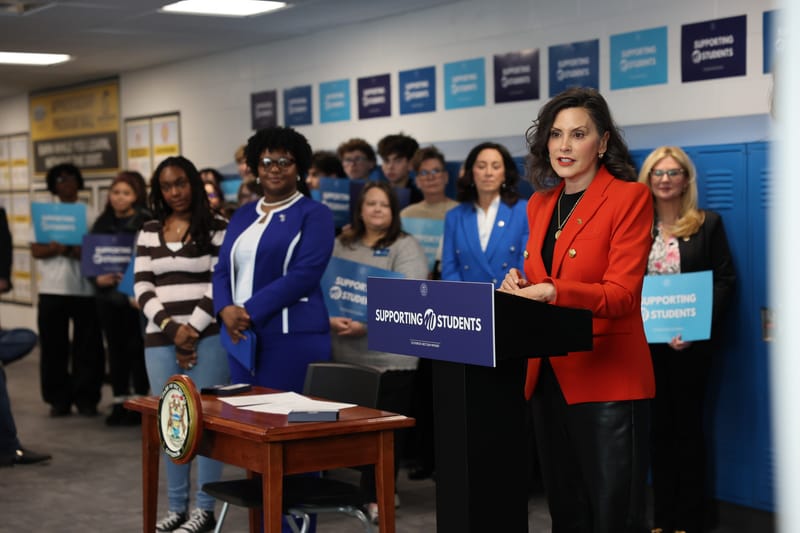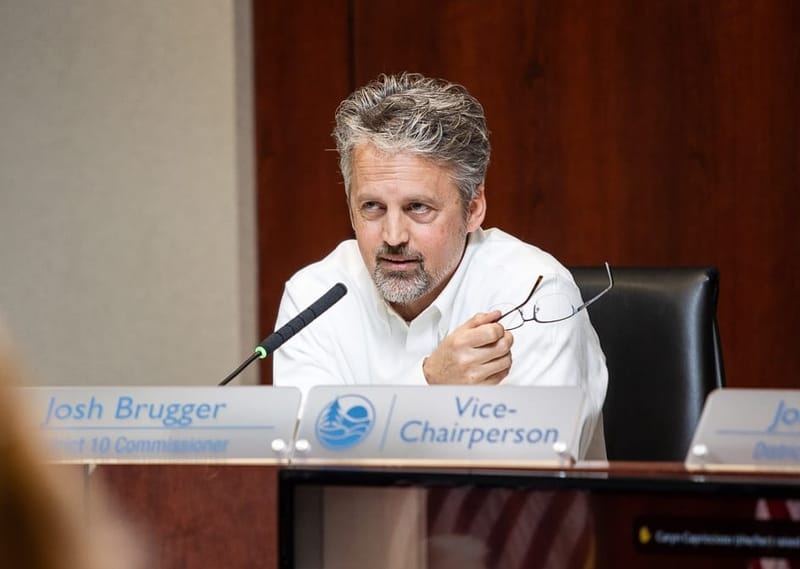Ottawa County kids, seniors face hunger as federal SNAP is halted; local resources strained
Those facing hunger in Ottawa County have some resources to fall back on during the uncertainty surrounding the Supplemental Nutrition Assistance Program, though the outcome remains unclear for local recipients.
OTTAWA COUNTY — Those facing hunger in Ottawa County have some resources to fall back on during the uncertainty surrounding the Supplemental Nutrition Assistance Program, though the outcome remains unclear for local recipients.
The potential cut is part of the federal legislative package, dubbed the "One Big Beautiful Bill Act" by the U.S. House of Representatives, which proposes unprecedented cuts to SNAP and Medicaid, affecting many Ottawa County residents.
The U.S. Department of Agriculture has informed Michigan and other states it intends to pause food assistance payments under the Supplemental Nutrition Assistance Program, or SNAP, after Nov. 1.
State officials and local organizations predict these reductions could plunge thousands into deeper food insecurity, drastically strain community support systems and trigger significant economic fallout.
The proposed legislation aims to slash nearly $300 billion from SNAP through 2034, marking the most substantial cut in the program's five-decade history. This is part of a broader legislative plan that also targets Medicaid, with combined reductions exceeding a staggering $1 trillion, according to state officials.
The latest
As of Saturday, Nov. 2, two federal judges have said the Trump Administration is required to use emergency funds to provide at least partial food stamp benefits to tens of millions of Americans in November, as the federal government shutdown drags on.
And President Donald Trump on Friday evening said he’s instructed the administration’s lawyers to ask the courts how it can legally fund the benefits as quickly as possible.
“Even if we get immediate guidance, it will unfortunately be delayed while states get the money out,” Trump posted on his own social media network, Truth Social. “If we are given the appropriate legal direction by the Court, it will BE MY HONOR to provide the funding, just like I did with Military and Law Enforcement Pay.”
Still, the much-needed assistance won’t come that quickly for many food stamp recipients. Also, it remains unclear whether they will receive their full benefits or a smaller amount because the USDA’s contingency fund doesn’t have enough money to cover the total cost.
Additional resources
- Dial 2-1-1 or visit Find Help- 211 for free, confidential assistance and referrals to local food programs and support services.
- Visit the Food Bank Council of Michigan to locate nearby food banks and learn about additional hunger relief efforts.
- Michigan’s Double Up Food Bucks Program – which is supported by a grant administered by the Michigan Department of Agriculture and Rural Development (MDARD) – is a program that gives Michigan families money to purchase groceries, including fresh fruits and vegetables.
- The Hunters Feeding Program, primarily funded through donations at the point of sale when customers purchase DNR licenses and/or permits, feeds an estimated 160 high-protein and nutritious meals per deer donated.
- As part of the FY26 budget, free breakfast and lunch will continue being provided to Michigan’s 1.4 million public school students.
- The Supper and Snacks program through which children participating in afterschool activities have access to dinner and snacks.
- The Emergency Food Assistance Program helps supplement the diets of income-eligible individuals and households by providing them with USDA foods at no cost.
Several legal and procedural challenges must be overcome before the benefits can start flowing to the nearly 42 million people in the program. USDA officials have said they halted November allocations because it doesn't have the funds to provide them, which prompted a coalition of Democratic-led states and a group of cities, nonprofits, unions and small businesses to sue earlier this week.
What is SNAP?
SNAP benefits are issued on EBT cards, which families use at grocery stores, farmers markets and other retailers. This spending circulates money directly back into the food supply chain and other retail sectors, generating revenue for local businesses and helping to pay wages.
SNAP also helps families prioritize other essential needs, with studies showing that children and older adults on SNAP are more likely to get regular medical check-ups and take their prescribed medications.
The loss of this benefit has prompted legal action from several states, including Michigan.
Michigan Attorney General Dana Nessel, along with 24 officials from other Democratic-led states and Washington, D.C., once again sued the Trump Administration on Tuesday, Oct. 28, asking a federal judge to order the federal government to cover food assistance costs for millions of Americans.
The lawsuit is just the latest Michigan's attorney general has joined.
Including the latest case involving SNAP, Nessel has joined lawsuits against the Trump Administration 35 times over such things as U.S. Department of Education cuts, birthright citizenship and pausing federal funds. Her office has also issued amicus briefs in 49 other lawsuits against the administration.
The Michigan attorney general's website includes a "federal actions tracker" that allows people to track the AG's actions against the government in what Nessel calls a "response to several unlawful federal policies and orders."
The lawsuit claims that the U.S. Department of Agriculture — which oversees SNAP — is unlawfully threatening to cease paying benefits after the first of November due to the federal shutdown.
Local concern
The Ottawa County Health and Human Services has voiced grave concerns, highlighting the statewide implications.
It’s a statewide concern as Michigan “faces an estimated annual loss of $800 million to $900 million in federal SNAP benefits, alongside an additional $90 million in new administrative costs,” according to a statement from the OCHHS.
Ottawa County has a network of food assistance organizations, including Ottawa Food, Feeding America West Michigan, Community Action House and Love in Action. However, these groups are not equipped to absorb the full impact of federal SNAP cuts, officials say.
“State Budget Office data indicates Michigan would likely be unable to absorb these shortfalls without drastically cutting other essential programs like education, public safety and Medicaid.”
Impact on Michigan, Ottawa County
More than 1.4 million Michiganders, or about 15 percent of the state's population, currently rely on SNAP. Over half of these recipients are families with children, and 39 percent include older adults or individuals with disabilities.
The proposed changes are projected to remove food assistance from more than 300,000 people statewide.
In a swift move to combat the looming loss of federal food assistance, Gov. Gretchen Whitmer, a Democrat, has directed $4.5 million in state funding to the Food Bank Council of Michigan. The emergency funds are intended to help feed families across all 83 counties.
The funding is designed to immediately boost the capacity of Michigan's food bank network, according to a press release. Crucially, the plan also includes support for food delivery to residents who lack transportation, ensuring assistance reaches those who cannot travel to a local food bank. The state is simultaneously working to align private philanthropic support to further assist families impacted by the SNAP disruption.
The pause in federal benefits comes amid a prolonged federal government shutdown, leaving millions of Americans, including an estimated 1.4 million Michiganders, facing a severe cut to their monthly grocery budget.
Whitmer emphasized the state's obligation to step in while the federal deadlock continues.
"Hungry families cannot wait for the folks in power in Washington, D.C., to do their jobs," she said.
"We take care of each other in Michigan, and we will continue bringing together public and private philanthropic resources to feed people as we approach the November 1 pause of SNAP."
Lt. Gov. Garlin Gilchrist II echoed the urgent need for action.
"SNAP helps countless Michiganders put food on the table and feed their families when times are tough," he said. "The federal government’s decisions have put SNAP in jeopardy. ... Today’s action will shore up community food banks who are working to fill the gap."
Michigan is one of several states moving to provide temporary solutions as the federal program — a crucial lifeline that helps roughly one in eight Americans buy groceries — is put on hold.
Support Our Work
Ottawa News Network is a nonprofit news service dedicated to providing the residents of Ottawa County with trustworthy, community-driven news. ONN treats journalism as a public good — something that enriches lives and empowers Ottawa County’s 300,000-plus residents to stay engaged, make informed decisions, and strengthen local democracy. Please consider giving today.
According to the OCHHS statement, for Ottawa County residents, the “impact estimates have not been completed at the county level.”
“However, in June 2025, 17,646 individuals in Ottawa County received SNAP; 7,198 of those recipients were children.”
A 2023 Youth Assessment Survey found 445 students sometimes, most of the time, or always went hungry due to insufficient food at home, with minority teens 1.5 times more likely to experience hunger.
Increased food insecurity expected statewide
The Michigan Department of Health and Human Services and the Michigan Department of Labor and Economic Opportunity recently highlighted the significant role of SNAP in supporting the state's economy and its residents.
In fiscal year 2024, SNAP helped 1.4 million residents by providing assistance for nutritious food, which directly reduces poverty, supports local jobs, and improves health outcomes. SNAP dollars are a powerful economic driver, with every dollar generating up to a $1.80 impact, much of which is spent in local communities.
This support is crucial as federal cuts to SNAP are anticipated to increase food insecurity and poverty, with an estimated $415 million negative impact on the state's economy due to new legislation regarding error rates, according to a press release.
These cuts present a major challenge for Michigan families and the state's overall well-being, said Director Susan Corbin of the Department of Labor and Economic Opportunity.
"Ensuring everyone has access to healthy food isn't just the right thing to do; it's an investment in our economic strength and shared future," Corbin said.
— Heather VanDyke covers northern Ottawa County for the Ottawa News Network. Contact her at hvandyke@ottawanewsnetwork.org.





